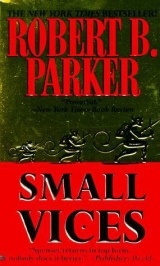
Текст книги "Small Vices"
Автор книги: Robert B. Parker
Жанр:
Крутой детектив
сообщить о нарушении
Текущая страница: 16 (всего у книги 16 страниц)
Chapter 54
WHEN THEY LET Ellis out, Hawk picked him up and brought him to my office. I had just finished endorsing the check from Cone, Oakes, and was slipping it into the deposit envelope when they came in.
"What are you going to do now?" I said to Ellis.
He was as tight and watchful and arrogant as he had been before, but now that he was out he was more talkative.
"You been in the place four years, what you do?"
"Whatever it was would involve a woman," I said.
"You got that right," he said.
"Try to make it voluntary," I said.
"You got no call talking to me that way," Alves said. "ah'm an innocent man."
"You didn't do Melissa Henderson," I said. "That's not the same as being innocent."
"You get me in here to talk shit?" Alves said.
"You need some money?" I said.
"'Course I need money," he said. "You think being inside a high-paying fucking job?"
I took two hundred dollars out of my wallet and gave it to him. It left me with seven, until I deposited the check, but the bank was close by. Ellis took the money and counted it and folded it over and slipped it into the pocket of his pale blue sweat pants.
"Ah' in supposed to say thank you?"
"We know you an asshole, Ellis," Hawk said. "You don't have to keep proving it every time you open your mouth."
"I just figure Whitey owe me something, and he making a down payment," Alves said.
Hawk looked at me and grinned. "Way to go, Whitey."
I nodded modestly.
"You got a job anywhere?" I said.
"No reason for you to be asking me about no job," Alves said. "It got nothing to do with you."
"Know a guy runs a trucking service out of Mattapan," I said.
"Don't need no help from you," Alves said.
"You did yesterday," Hawk said.
"I'm supposed to be grateful?" Alves said. "I'm in for four years on something I didn't do, that some honky rich kid done, and they let me out and ah'm supposed to say thank you?"
"Actually it was a nigger rich kid," Hawk said. "And they didn't let you out, Spenser got you out."
"And he got paid for it too, didn't he? Who gonna pay me for my four years?"
"Actually," I said, "two hundred is probably about what four years of your time is worth. You want that trucker job give me a call."
"Don't you be sitting 'round waiting," Alves said.
He turned toward the door and hesitated fractionally while he looked at Hawk, saw no objection, and walked out of my office.
"Glad he didn't get all sicky sweet with gratitude," Hawk said.
"Yeah," I said. "It's always so embarrassing."
"He be back inside in six months," Hawk said.
"I hope so," I said.
We were quiet for a moment…
"I probably wouldn't have made it back without you," I said to Hawk.
"Probably not," Hawk said.
I picked up the deposit envelope and looked at it.
"What do you think he'll do with the two hundred?" I said.
"Depends," Hawk said. "If he don't have a gun, he'll buy one. If he does, he'll spend it on a bottle of booze and a woman."
"Nice to know he's got priorities," I said.
"Good to know what they are, too," Hawk said.
I nodded and looked at the deposit envelope again. It was a lot of money.
"I might have made it back alone," I said.
Hawk smiled his charming heartless smile.
"Maybe," he said.
Chapter 55
RUGAR'S TESTIMONY CONVICTED Don Stapleton. Clint's confession was supported by Hunt McMartin and the lissome Glenda. He too was convicted. Both convictions were being appealed when they let Rugar out. Brooks told me when he was getting out, and I met him on the steps of the new Suffolk County jail. The first snow of the season had begun to fall, it was only a degree or two away from rain, and it fell like rain, straight down, and small.
"You kept your word," Rugar said.
He was wearing a gray tweed overcoat with a black velvet collar. He turned the collar up as he stood in the falling snow. He was still gray. I wondered if his color was connected to some internal coldness, like a gray reptile.
"You kept yours," I said.
We walked down the steps together, carefully, because they had already become slippery, and turned right toward North Station and the new Fleet Center.
"The nigger get out?" Rugar said.
"Yes."
"They tell me Stapleton's got that appellate specialist from Harvard," he said, "working on the convictions."
"They've got a lot of money."
"Probably have enough," Rugar said. "You have enough and the law makes a lot less difference."
Time in jail had made no difference to him. He still spoke with the voice-under harmonic of some internal force.
"So young," I said, "yet so cynical."
"If there's a retrial, I won't be around to testify," Rugar said.
I shrugged.
"I do what I can," I said. "Alves is out of jail."
"You like him?" Rugar said.
"No," I said.
Rugar nodded slowly. "Work is work," he said.
"You ought to know."
Rugar made a motion with his mouth which he probably thought was a smile.
"Yes, liking or not liking has never had much to do with my work either," he said.
We were on Causeway Street now. There were cabs lined up in front of North Station. Rugar signaled to one and waited while it pulled forward to him.
As he waited he turned and looked at me. "You won this time."
"Yep."
"There may never be a next time."
"Yep."
"But if there is," he said, "I plan to win."
He stared at me. His eyes had no animation in them. It was like looking at the underside of two bottle caps.
"I like a cheery optimism," I said. "It's good to get up each morning as if your hair were on fire."
Rugar continued to look, the way you might survey a project you might someday undertake. He stood stock still while he looked. But the low throb of deadliness seemed somehow alive between us, as if his gray corporeal self was an insignificant replication of the near Satanic energy that was his real self. Then the cab pulled up and he turned toward it.
"Rugar," I said.
He turned half bent to step in the cab and looked back at me.
"I took you once," I said. "I'll take you again."
Rugar's expression didn't change. For all I know he didn't hear me. He turned back to the cab and stepped in and shut the door. He said something to the driver and the cab pulled away in the steady straight-down snowfall. I watched it until it was out of sight.
Not killing him may have been an error.
Chapter 56
SUSAN AND I were standing with Pearl on the sidewalk of the Larz Anderson Bridge, leaning on the parapet, looking down at the river on a late afternoon in early winter, while the homebound traffic edged toward Harvard Square. The light that lingered after sunset colored the atmosphere blue, and the snow along the river looked whiter than I knew it to be. A couple of hundred yards downstream, the Weeks Footbridge was a graceful arch over the current.
"A year," Susan said, staring down at the slick black surface of the water. Between us, Pearl reared up on her hind legs and put her forepaws on the parapet and stared downriver, too. I didn't wonder what she was thinking. It was aimless, and I was glad I didn't know. It was one of the things about the link between people and dogs that I liked. Neither would ever fully know the other. Maybe it was true of the link between people and people, too.
"Why was the relationship between Clint and Melissa such a secret? Was it Clint being black?"
"Yes."
"How awful."
"Yes."
"How awful for her parents," Susan said. "How awful for the Stapleton family."
"Yeah."
"They had everything, money, position, each other. The girl was lovely and successful, wasn't she?"
"So they tell me."
"The boy was handsome and accomplished."
"And he didn't mean to kill her," I said. "Just a little exotic sex."
"And it destroys his whole family, the father, the son-the mother must be devastated…"
"To save a career criminal who'll be back in jail in no time," I said.
"And a professional killer goes free to accomplish it."
"Yeah."
"You don't even need his testimony, now," Susan said. "The Stapletons confessed."
"Yep."
"But he goes free anyway."
"A deal's a deal," I said. "We needed the threat of his testimony to get the confessions."
"And the Stapletons go to jail while two career criminals go free."
"Couldn't have said it better myself."
"They are both guilty of things," Susan said. "But the people going free are probably guilty of more things."
"Almost certainly."
"And the father was trying to save his son."
"Yep."
"Doesn't seem right, does it."
"No."
"On the other hand, you can't make it seem righter by letting the Stapletons go."
"Probably not," I said.
"Do you think the boy confessed to get his father?" Susan said.
"Yes," I said. "There was something ugly there. I don't know what it was, but it had to do with race."
"Sometimes interracial adoptions are very painful. The parents get caught up in a racism they didn't know they had. Fearful that the child will be black, which is to say had they work too hard to make him be good, which is to say white."
"Pygmalion," I said.
"Something like that. It fosters dreadful resentments within a family."
"Something did that here," I said. "On the other hand, they are very rich. They are appealing the convictions…"
I shrugged.
"I'm not criticizing you, in all of this," Susan said.
"I know you're not," I said. "The confusion of guilt and innocence just looks a little starker in this case and it interests you."
She smiled. Pearl got sick of looking at the river, or sick of standing on her hind legs, or both, or neither, and dropped down to all fours and looked up at us questioningly. I scratched her ear.
"How do you feel about all this?"
"As little as possible," I said. "The Stapletons are not without resources. They'll get the best justice money can buy. The kid especially. A good lawyer may convince a jury that Melissa Henderson was complicit in her own death, that Clint was doing what she wanted. But I know a couple of things. I know that Melissa Henderson shouldn't be dead. I know that no one should have framed Ellis Alves."
"Or hired someone to kill you," Susan said.
"I might do that to save my son," I said.
Susan looked up at me in the now thickening darkness.
"No," she said, "you wouldn't. You might kill someone to save your son, but you wouldn't hire someone to do it."
I put my arm around her and she leaned her head against my shoulder.
"But since we don't have a son, and won't, I guess the question is moot."
"We have Paul," she said softly.
"True."
"You'd kill someone to save him."
"Yes," I said.
"And we have Pearl."
"A son and a daughter," I said. "No need to adopt at all."
Susan laughed softly. Pearl looked up at the sound and wagged her tail. And we stood together like that as night fell and the river ran.








